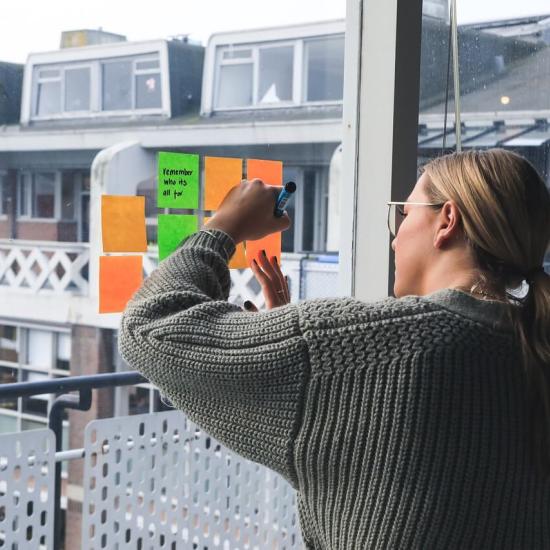Organisational reinvention has been going on all around us – sudden, and often unplanned.
During 2020, like many people, I bought a take-away meal from a hotel, watched a play filmed in the actor’s living room, and joined a choir full of singers who had never met each other. Creative workshops which used to be run for small groups of paying participants became virtual and temporarily free, while pubs briefly became retailers to get rid of their stock before lockdown.
There is more reinvention to come in 2021, now planned more carefully to accommodate the medium and long-term effects of the pandemic. Consumer buying patterns have changed, and companies will need to cope with new economic circumstances.
Organisations will also have to adapt to the alterations in some basic assumptions about how they operate: for example, how will leaders lead if they only see their teams face-to-face once a month? If employees only intermittently come to the office, how will important but informal organisational learning happen? There’s work to be done for strategy teams inside organisations to consider a range of scenarios and devise options for how they might respond.
The challenge and opportunity for individuals
This reinvention challenge faces each of us as individuals, too. Although the world of work has been steadily changing over the last decade, 2020 saw radical and rapid shifts, and some of these are likely to be permanent.
But our reinvention challenge is not just about responding to external factors. Experiencing the pressures of lockdown constraints, many people reported that they were starting to think differently about their work, about why they work, and how and where they want to work in future.
In an online webinar for alumnae of the Women Transforming Leadership programme in April 2020, early in the pandemic, many women were already talking about viewing their working lives very differently, and those conversations have continued in our online development programmes. In December, we asked over 100 participants who were about to graduate from our online Women’s Leadership Development Programme what their New Year’s resolution for 2021 might be.
In reply, they talked about wanting to work differently: finding new roles, joining industry networks to broaden their perspective, or collaborating more closely with their peers to build and sustain confidence.
They talked about the changes they wanted to make with a sense that now is the time to make them, while so much else is changing.

The approach that organisations take to navigate changing markets successfully and sustainably can be useful for you, too.
Developing a strategy for you
Just as the reinvention challenge may be the same for us as for organisations, so the solutions are too. The same strategic processes used by organisations can be used for our own individual reinvention.
If you want to build a new definition of your working life in this new context, you’ll probably want to start by reassessing what you have to offer now - your skills, experience and interests.
That’s precisely where strategy reviews often start. You’ll want to examine your current working arrangements to see what you want to keep or what you want to alter, given the new circumstances. You’ll want to consider the options for a new working future and think about how to make those a reality.
These are precisely the kind of activities that strategy formulation involves. The approach that organisations take to navigate changing markets successfully and sustainably can be useful for you, too.
I’ve spent the last decade applying corporate strategy ideas and frameworks to individual lives, working with executives from all over the world on their career objectives and their plans for their working lives. This process is built around some obvious questions, which are easy to ask, but not always simple to answer: Where are you now in your working life? Where do you want to be? And how might you get there?
Why the reinvention challenge is worth facing
Rising to the reinvention challenge is a skill which we have all needed in 2020, and will definitely need in 2021. Both research and practical experience suggests that it is a particularly useful skill for women. The multiple roles women play at work and outside, at home and in the community make it important to find “work that works” for us, for employers and for our personal stakeholders, family and community.
For example, there is a navigation challenge in finding a new job when a partner is suddenly relocated, or family responsibilities require part-time working for a while. There are visible phases in women's lives with different imperatives and constructing a strategy around these is a real skill that can pay off in finding useful, meaningful work, which puts food on the table and still accommodates other roles and responsibilities.
A strategy built around your purpose makes it easier to choose what to do.
Applying a corporate strategy process to oneself has all sorts of benefits. It’s a rigorous activity that generates useful insight; if you can articulate where you are headed - your sense of your direction - it will be easier to devise some practical next steps.
A strategy built around your purpose makes it easier to choose what to do, and what not to do. It allows you to think more clearly about where to invest your time in developing your skills - focusing on your natural and potential strengths rather than repeatedly trying to correct the areas of weakness that we all have.
Your strategy will also be more use to you than a career plan, which can seem rigid and constraining in a turbulent working world.
So, a New Year’s resolution to review your own strategy might be the ideal way to start 2021 and get ready for the challenges and the opportunities of the year ahead.
Kathryn Bishop is an Associate Fellow at the Saïd Business School and at Green Templeton College. Her book on this subject – Make Your Own Map: Career Success Strategy for Women – was published on 3 February 2021 by Kogan Page.




